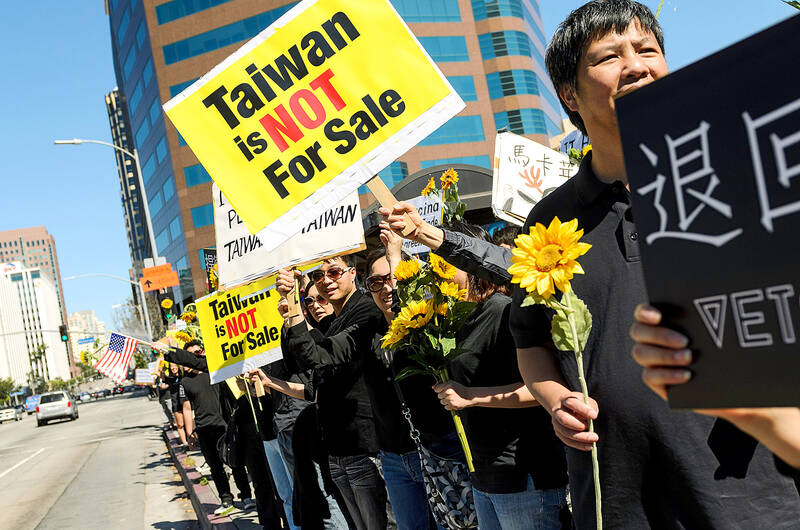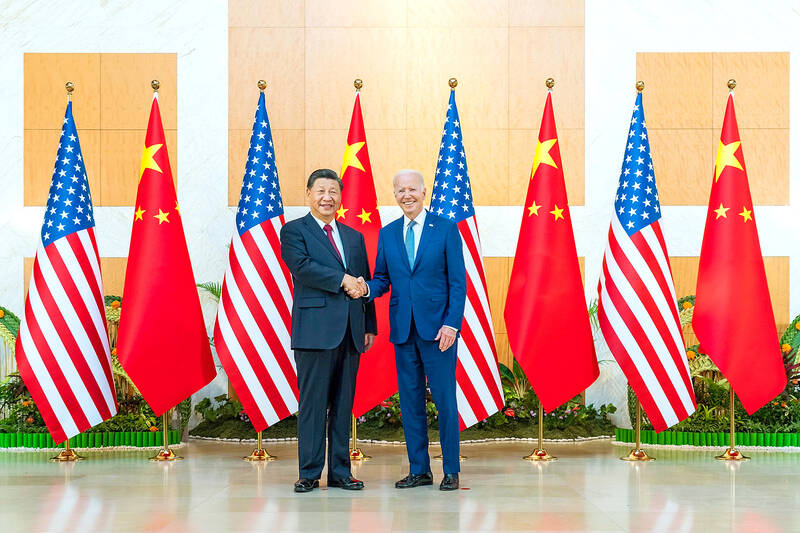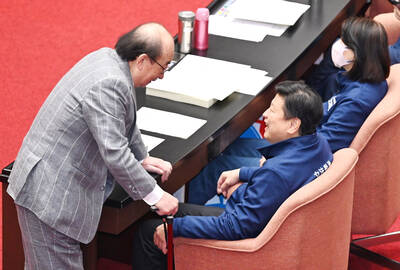Last week, the presidential campaign of Taiwan People’s Party (TPP) candidate Ko Wen-je (柯文哲) tapped Cynthia Wu (吳欣盈), the granddaughter of Shin Kong group founder Wu Ho-su (吳火獅), as his vice-presidential candidate. Wu and her vast wealth seem to fly in the face of Ko’s claim to be offering new, cleaner politics.
She wasted no time putting the peasants in their proper place. Asked last week by a reporter if she would publicly reveal that she had given up her US citizenship, Wu tartly responded that it was an issue between herself and the US government. The following day, when asked by a reporter about telling her family she was going to be Ko’s veep pick, she snapped back: “Did you tell your parents when you decided to be a reporter?”
A wiser politician would have used that as a moment to humanize herself and her family.

Photo courtesy of Wikimedia Commons
Both Ko and Chinese Nationalist Party (KMT) presidential candidate Hou You-yi (侯友宜) last week brought up economic agreements with the People’s Republic of China (PRC). Hou again announced that if elected he would revive the unpopular services pact that triggered the Sunflower movement in 2014 and crushing KMT defeats at the ballot box in that year and 2016.
Meanwhile Ko said that instead of entering the Comprehensive and Progressive Agreement for Trans-Pacific Partnership (CPTPP), Taiwan should enter the PRC-led Regional Comprehensive Economic Partnership (RCEP) by opening talks with Beijing. Ko contended that Taiwan, a globalized economy and world leader in tech industries, is not ready for the stricter information security rules, greater labor rights and lower tariffs of the CPTPP.
Not surprisingly, both pro-China candidates Ko and You, appealing to the same base, are offering closer links with the PRC as an economic panacea. Ko added that the southbound policies of President Tsai Ing-wen (蔡英文) are impossible without first going west. This echoes former president Ma Ying-jeou’s (馬英九) claim in support of his pro-China economic policies that Taiwan needed to go to the world through China.

Photo courtesy of Wikimedia Commons
Mind you, this is the same Ko that in April said in an interview with Bonnie Ling hosted by the Center for Strategic & International Studies that the Economic Cooperation Framework Agreement (ECFA) had made Taiwan overdependent on China. Ironically, this statement was made in the same week that outbound investment from Taiwan to southeast Asia exceeded Taiwan investment in the PRC, according to the Ministry of Economic Affairs.
Local media also reported that Ko observed, in a response to a question about what he would do differently to achieve better relations with the PRC, that cross-strait relations are the “Taiwan issue” of the US-China rivalry, which Taiwan must navigate.
Ko’s language locates Taiwan “between” the PRC and the US, as if Taiwan has no conflict of its own with the PRC. This is dangerously close to the PRC’s own propaganda claim that Taiwan is no more than a pawn of the US in a Great Power game.
This “betweenness” of Taiwan is a common claim in the numerous conversations about US-PRC relations and the Taiwan issue. It is wrong in many different ways.
For one, Taiwan is not between the PRC and the US, but is also an important issue for Japan and the Philippines. The PRC position is to turn those two nations into pawns of Uncle Sam as well. It is easy to see how this can only succeed by removing agency from all players except the US, a common and particularly stupid ideological position on the left.
Another step, a common one among PRC apologists, is to simply remove Japan and the Philippines from the discussion. Indeed, if an article about the Taiwan issue is silent on Japan and its interest in keeping Taiwan free, that is generally a signal that one is reading PRC propaganda.
Ideological positions that remove agency from Taiwan are easy to spot and counter by restoring the Taiwanese themselves to the discussion. Indeed, because it is so clear, people often stop there. “Sure,” one might say, “Taiwan is between the US and the PRC, but we have our own agency.” That is sufficient to squelch most leftist ideological idiocy. Yet perhaps it should be taken one step further.
The “Taiwan is between” position seems more rational because it positions Taiwanese as victims of the Great Power aspirations of both sides. But the implicit framework it posits is a false one.
Imagine a world in which the PRC was not an expansionist power. A world in which it is a populous state bordered by the independent states of Tibet and East Turkestan. A world in which it did not have a navy that was built to destroy the US navy. A world in which it did not demand that Taiwan, the South China Sea and the Senkakus be handed over to it.
Where would Taiwan be then? It would be something like Malaysia, South Korea or the Philippines are in our current world. The “Great Power competition” between the PRC and the US would simply be a matter of economic issues to be negotiated between the two governments. There would be no military issues. There would be no need for “freedom of navigation” transits through the Taiwan Strait or the South China Sea. The media would not constantly refer to the tensions between the PRC and the US that appear to arise without origin, the Augustinian First Cause of cross-strait relations.
If Taiwan is located “between” the PRC and the US, the allegedly hapless victim of a Great Power competition, it is only because PRC expansionism has put it there.
In other words, just as describing Taiwan as a pawn of the US is a pro-PRC ideological position that succeeds by removing Taiwan’s own agency, positing that Taiwan is “between” the US and China is a pro-PRC ideological claim that only makes sense because it quietly removes PRC agency — expansionism — from the equation and treats the US-PRC rivalry as a pre-existent uncaused cause.
What is the historical counterexample? Japan. In the 1980s there were books arguing that Japan and the US were going to war and that Japan would eventually displace the US as the globe’s leading power. Japan engaged in many practices that China does, including technology theft and setting up market barriers. But there were never war tensions between the US and Japan, nations did not “pick sides,” and problems between them were addressed via negotiations.
Why did things break that way? Because Japan was not an expansionist power.
Notes from Central Taiwan is a column written by long-term resident Michael Turton, who provides incisive commentary informed by three decades of living in and writing about his adoptive country. The views expressed here are his own.

On Jan. 17, Beijing announced that it would allow residents of Shanghai and Fujian Province to visit Taiwan. The two sides are still working out the details. President William Lai (賴清德) has been promoting cross-strait tourism, perhaps to soften the People’s Republic of China’s (PRC) attitudes, perhaps as a sop to international and local opinion leaders. Likely the latter, since many observers understand that the twin drivers of cross-strait tourism — the belief that Chinese tourists will bring money into Taiwan, and the belief that tourism will create better relations — are both false. CHINESE TOURISM PIPE DREAM Back in July

Could Taiwan’s democracy be at risk? There is a lot of apocalyptic commentary right now suggesting that this is the case, but it is always a conspiracy by the other guys — our side is firmly on the side of protecting democracy and always has been, unlike them! The situation is nowhere near that bleak — yet. The concern is that the power struggle between the opposition Chinese Nationalist Party (KMT) and their now effectively pan-blue allies the Taiwan People’s Party (TPP) and the ruling Democratic Progressive Party (DPP) intensifies to the point where democratic functions start to break down. Both

Taiwan doesn’t have a lot of railways, but its network has plenty of history. The government-owned entity that last year became the Taiwan Railway Corp (TRC) has been operating trains since 1891. During the 1895-1945 period of Japanese rule, the colonial government made huge investments in rail infrastructure. The northern port city of Keelung was connected to Kaohsiung in the south. New lines appeared in Pingtung, Yilan and the Hualien-Taitung region. Railway enthusiasts exploring Taiwan will find plenty to amuse themselves. Taipei will soon gain its second rail-themed museum. Elsewhere there’s a number of endearing branch lines and rolling-stock collections, some

This was not supposed to be an election year. The local media is billing it as the “2025 great recall era” (2025大罷免時代) or the “2025 great recall wave” (2025大罷免潮), with many now just shortening it to “great recall.” As of this writing the number of campaigns that have submitted the requisite one percent of eligible voters signatures in legislative districts is 51 — 35 targeting Chinese Nationalist Party (KMT) caucus lawmakers and 16 targeting Democratic Progressive Party (DPP) lawmakers. The pan-green side has more as they started earlier. Many recall campaigns are billing themselves as “Winter Bluebirds” after the “Bluebird Action”